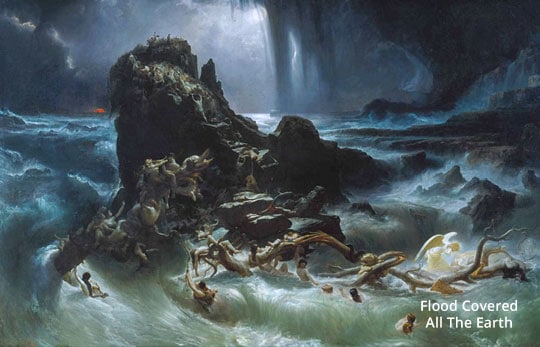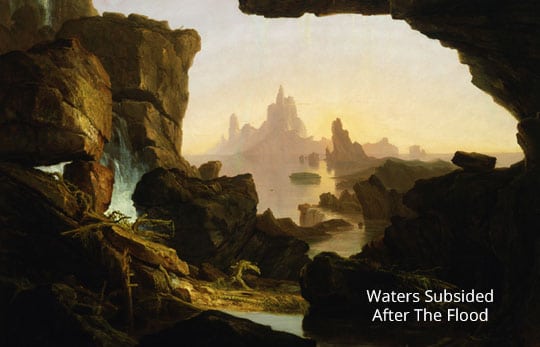Bible Question:
Was there rain after the flood in Genesis?
Bible Answer:
Was there rain before and after the flood in Genesis? The first time that rain is mentioned in the book of Genesis is in chapter two. What follows will explain what the book of Genesis records about the first rains.

Was There Rain Before Noah’s Flood?
In Genesis 2:5-6 we are told that a mist would rise up from the earth and water the surface of the ground since rain had not yet occurred in the new creation.
Now no shrub of the field was yet in the earth, and no plant of the field had yet sprouted, for the LORD God had not sent rain upon the earth, and there was no man to cultivate the ground. But a mist used to rise from the earth and water the whole surface of the ground. Genesis 2:5-6 (NASB)
The Hebrew word translated as “rain” is matar. This verb refers to falling condensed water. It was not mist. Genesis 1 and 2 do not record rain falling on the earth.
The first time the Bible records falling rain is in Genesis 7:4. Genesis 7:1-4 describes the instructions God gave to Noah. God told Noah that rain was going to destroy every living thing on the earth. It would be a worldwide flood (Genesis 6:17; 7:19-20, 22).
Then the LORD said to Noah, “Enter the ark, you and all your household, for you alone I have seen to be righteous before Me in this time. You shall take with you of every clean animal by sevens, a male and his female; and of the animals that are not clean two, a male and his female; also of the birds of the sky, by sevens, male and female, to keep offspring alive on the face of all the earth. For after seven more days, I will send rain on the earth forty days and forty nights; and I will blot out from the face of the land every living thing that I have made.” Genesis 7:1-4 (NASB)
So Noah, and we assume his sons, built the ark and Genesis 7:11-12 describes how God caused the worldwide flood.
In the six hundredth year of Noah’s life, in the second month, on the seventeenth day of the month, on the same day all the fountains of the great deep burst open, and the floodgates of the sky were opened. The rain fell upon the earth for forty days and forty nights. Genesis 7:11-12 (NASB)
The Hebrew word that is used for rain in Genesis 7:12 is gesem. It is a noun that refers to water drops. We believe that the water drops came from the water canopy or expanse that is described in Genesis 1:6-7. We believe that God broke up the water canopy and it descended as water drops over the forty days and forty nights. Verses 19-20 tell us that so much water covered the land that the surface of the water was fifteen cubits (22.5 feet or 6.858 m) higher than the highest mountain. That was the first rain and it lasted for five months (compare Genesis 7:11 and Genesis 8:3-4).

Was There Rain After Noah’s Flood?
Genesis 8:1-2 states that after the forty days and forty nights God stopped the outpouring of water upon the land and stopped the rain.
But God remembered Noah and all the beasts and all the cattle that were with him in the ark; and God caused a wind to pass over the earth, and the water subsided. Also the fountains of the deep and the floodgates of the sky were closed, and the rain from the sky was restrained . . . Genesis 8:1-2 (NASB)
The Hebrew word that is used for rain in Genesis 8:2 is gesem, or water drops.
Scripture is silent about water drops or falling rain in the book of Genesis after the flood stopped in Genesis 8:3-4. Rain is not mentioned again until Exodus 9:18, 23 and then again in Leviticus 26:4. In Exodus 9:18, 23 we are told that hail dropped. Hail is frozen water drops. This means that it was raining and the cold air caused the rain drops to freeze.
Behold, about this time tomorrow, I will send a very heavy hail, such as has not been seen in Egypt from the day it was founded until now. Exodus 9:18 (NASB)
Moses stretched out his staff toward the sky, and the LORD sent thunder and hail, and fire ran down to the earth. And the LORD rained hail on the land of Egypt. Exodus 9:23 (NASB)
In Leviticus 26:4, we find the word for rain drops, gesem, for the first time outside of the book of Genesis.
. . . then I shall give you rains in their season, so that the land will yield its produce and the trees of the field will bear their fruit. Exodus 9:18 (NASB)
Conclusion:
Rain reminds us of God’s blessings. Rain is something that we cannot control. We try to influence it but man has yet to demonstrate that he can control rain. I do not believe that God will let him control it. God uses rain to bless and to punish (Amos 4:7; Zechariah 10:1; 14:17-18). From the biblical record we learn that the first rain to fall on the earth was the rain that resulted in the worldwide flood of Noah’s day. Ever since God has chosen to provide the water needed for life on planet earth through the process of falling rain. The Psalmist writes these words of praise to our Lord God. Notice that he says God provides the rain.
Sing to the LORD with thanksgiving;
Sing praises to our God on the lyre,
Who covers the heavens with clouds,
Who provides rain for the earth,
Who makes grass to grow on the mountains.
Psalm 147:7-8 (NASB)
Suggested Links:
Did it rain before the great flood of Noah?What is the meaning of the rainbow?
What happened to the flood waters of Noah’s day?